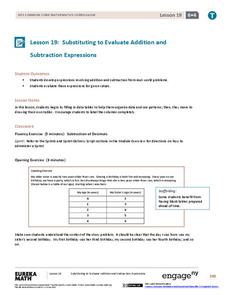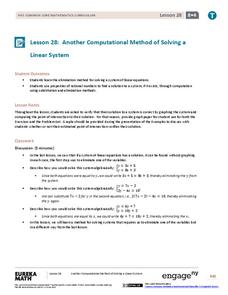EngageNY
Substituting to Evaluate Addition and Subtraction Expressions
Substitute this resource for what you used to use. Learners identify patterns in data tables and write addition and subtraction expressions to represent relationships. Substitution allows them to solve problems in context in the 20th...
EngageNY
Nature of Solutions of a System of Linear Equations
If at first you cannot graph, substitute. The lesson introduces the substitution method as a way to solve linear systems if the point of intersection is hard to determine from a graph. The 28th installment of a 33-part series finishes...
EngageNY
Replacing Letters with Numbers
When did letters become the same as numbers? Scholars learn about substituting numbers for letters to evaluate algebraic expressions in the seventh part in a series of 36. The lesson focuses on expressions related to geometry, such as...
Bowland
Soft Drinks
"Statistics are no substitute for judgment" - Henry Clay. Young mathematicians use provided statistics from a soda taste test to explain why conclusions are faulty. They devise a new test that would be more appropriate than the one given.
EngageNY
General Pyramids and Cones and Their Cross-Sections
Are pyramids and cones similar in definition to prisms and cylinders? By examining the definitions, pupils determine that pyramids and cones are subsets of general cones. Working in groups, they continue to investigate the relationships...
Curated OER
Two Points Determine an Exponential Function II
Your algebra learners will build an exponential equation given a graph with two specific points labeled.
Curated OER
Two Points Determine an Exponential Function I
Learners construct an exponential function from a graph, and two given points on the graph, as they analyze what makes up an exponential function.
Noyce Foundation
Boxes
Teach your class to think outside the box. Scholars use the concept of equality to solve a problem in the assessment task. They determine how to use a scale to identify the one box out of a set of nine boxes that is heavier than the others.
Curated OER
Forms of Exponential Expressions
Your young physicists analyze the forms of four equivalent exponential expressions representing an amount of a radioactive material in a substance. They show how each expression is equivalent to the others and what aspects of the decay...
Curated OER
Profit of a Company
Your business executives choose which of three equivalent forms of a quadratic equation is the most useful for finding various pieces of information in this task centered on a company's profits.
Curated OER
Compounding with a 5% Interest Rate
The balance in an account continuously compounding interest is the context of this engaging task. Your young accountants will investigate the ending balance in an account as they compound the interest more and more. Learners write the...
Curated OER
Temperature Conversions
Your young weather buffs use compositions and inverses of functions to convert between Celsius, Fahrenheit, and Kelvin degrees. Then they analyze possible compositions and whether they exist in the real-life context.
EngageNY
Find Solutions to Make Equations True
The truth is always best. Individuals continue to find values that make equations true in the 26th installment of the 36-part module. The only difference is that they now call them solutions to those equations.
EngageNY
Another Computational Model of Solving a Linear System
The process of elimination really works! Use elimination when substitution isn't doing the job. The 29th segment in a series of 33 introduces the elimination method to solving linear systems. Pupils work several exercises to grasp the...
EngageNY
True and False Number Sentences
True or false? Scholars determine the truth value of equations and inequalities through substitution. All values to use for substitution are given with each equation or inequality. This is the 24th lesson in a module of 36.
Illustrative Mathematics
Assessing Counting Sequences Part II
Access the instructional counting level of your class by prompting them to recall consecutive numbers within a given number range. Working one-on-one with your students and starting with the number range of 1-10, and working toward the...
Illustrative Mathematics
Assessing Counting Sequences Part I
Working with kindergartners one-on-one, you will identify their ability to count by 1s and 10s and conclude what levels they have mastered, as well as where they need skills practice and instruction. The commentary provided will aid you...
Illustrative Mathematics
Introduction to Linear Functions
Introduce your algebra learners to linear and quadratic functions. Learners compare the differences and relate them back to the equations and graphs. Lead your class to discussions on the properties of a function or a constant slope...
Illustrative Mathematics
The Physics Professor
Help mathematicians see that a formula found in a physics book has an algebraic structure. Though the formula given in the resource looks complicated, learners are to break down the expressions and interpret each part separately....


















